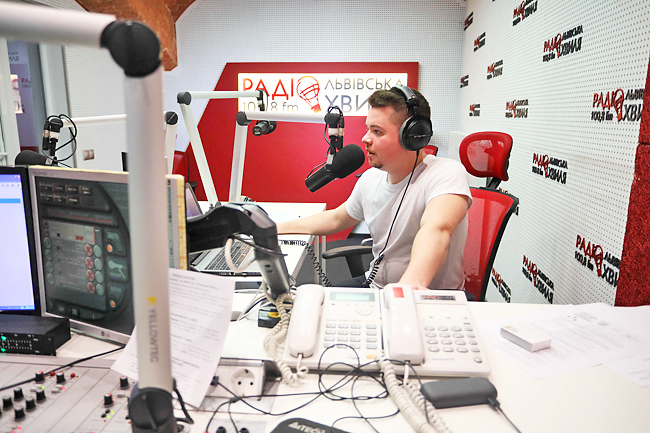LVIV, UKRAINE (AFP) – The Lvivska Khvylya local radio station in west Ukraine changed its broadcast output dramatically the day Russia invaded the country.
The first thing staff did was to ease off on the entertainment programming and ramp up coverage of the war for their tens of thousands of listeners.
“We are an entertainment and music radio station but we’re doing a lot of news because citizens need a lot of information in these times,” 28-year-old host on Lvivska Khvylya (Wave of Lviv) Volodymyr Melnyk told AFP. He was speaking in the station’s brand-new studio in Lviv, a city 80 kilometres from the Polish border.
Between Ukrainian pop hits, Melnyk and his colleague Andryi Antoniuk, 41, lighten the mood with quips about the conflict.
“In times of war, we need to be positive. We can make fun of Putin and of the Russian troops who can’t take our cities, but we can’t have so much fun as we had before the war,” said Melnyk who has been working for the station for eight years.
Years before Russia sent troops to Ukraine on February 24, the station had already once before pivoted to war.
Staff shook up their programming in 2014, when Moscow annexed the Crimean peninsula from Ukraine and threw its weight behind separatists in the east of the country.

“The war affected our work, because there is a psychological factor that initially prevented us from working,” said 27-year-old journalist Marta Oliyarnyk.
“All these events could not leave us indifferent,” she said behind a large pair sunglasses.
In 24 days of war, the station – which has been on air for around 30 years – has become an even more crucial link between its listeners and the authorities.
Before the war it boasted between 300,000 and 400,000 listeners per day. That figure has now doubled. Those listeners are served up news on school closures and also on the humanitarian situation in the city. They also get updates on fierce fighting in the south and east of the country.
Oliyarnyk said she aims to find a balance between local and national news on the 5pm news broadcast for Lviv listeners, a task she likens to a “public service mission”.
The station runs its own programming until 7pm, at which point it hands over state-sponsored conflict coverage.
To boost morale, news of civilian and military casualties is not the focus of broadcasts.
“These figures frighten us. We experience it personally, but we try to give people a lot of positive information, such as what losses to the enemy and how many units of military equipment were destroyed by our military.”
The true human toll, she said, can only be properly calculated when fighting ends.
Several times a day, sirens interrupt the broadcasts.
Last Friday morning, the station’s 31-year-old Technical Director, Vasyl Pakuch, broadcast the alarm from his home, calling on the population to go to the shelters.
That day, local authorities said Russian missiles had hit Lviv’s regional airport district, an attack that did not lead to any casualties.
From his small office, that overlooks the studio, Pakuch monitors the dozens of broadcast towers that send out Wave of Lviv around western Ukraine and as far east as Kyiv.
The tower nearest the capital, whose outskirts have been caught up in fierce fighting, has been damaged by Russian strikes twice.
Another was hit during strikes on Rivne on March 14 that left nine dead.
“These towers are critical infrastructure. It’s dangerous for the population when they’re attacked because the connection is lost,” said Pakuch, gesturing to the Lviv tower.
He said he would go to any length to repair it if it were damaged.
“Even if they destroy a tower, we will climb a tree with an antenna and we will still turn on the radio wherever we are. It’s not a problem,” he said.


